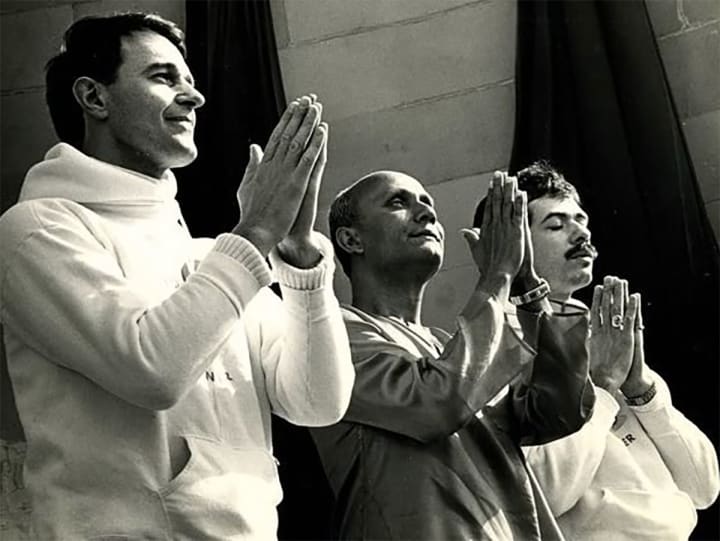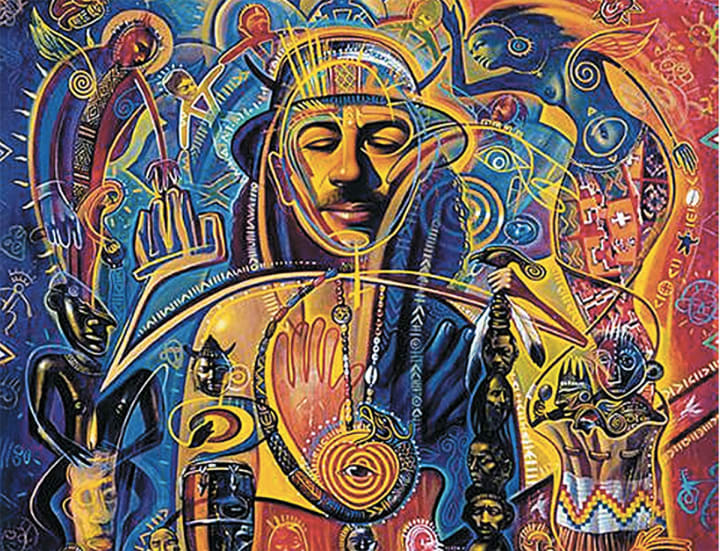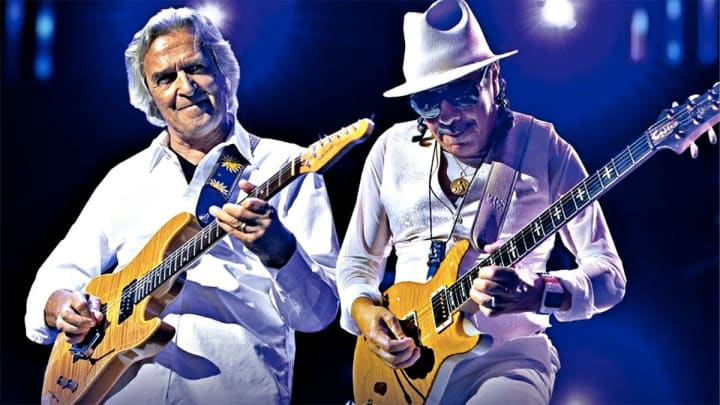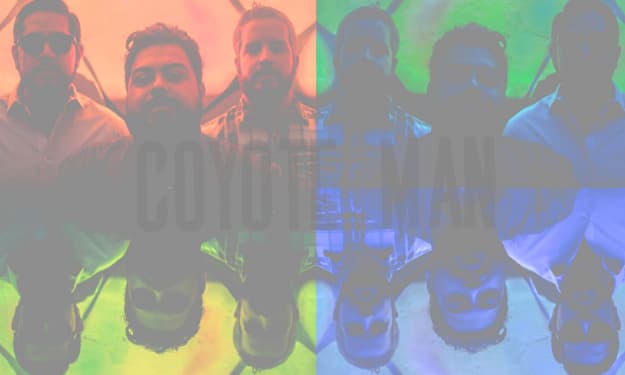Carlos Santana Interview
One of the greatest guitarists of all time, Carlos Santana explores his mind, music and musings in a vintage 1974 interview.

Carlos Santana, known for combining rock and Latin American music, hasn't shied away from playing music, selling out concert halls and true to form, seldom misses an opportunity from discussing controversial topics. During an interview with Viva back in April of 1974, he discussed religion and spiritually with his quintessential candidness.
Emilio Estefan's tribute video "We're All Mexican" features an ensemble cast including actress Eva Longoria, director Alejandro González Iñárritu (Birdman), artist Frida Kahlo, and of course, Carlos Santana. The song communicates through metaphor that everyone is vulnerable to victimization, so racism and bigotry are everyone's problem; given Santana's many years of advocating for social justice and political issues, it's not surprising that he spearheaded peaceful protests, too. The Viva interview with Santana and his musical collaborator John McLaughlin is a snapshot of the thoughts and spiritual exploration that consumed them one particular day in 1974.
Hot on the heels of Carlos Santana's commercially profitable collaboration with drummer Buddy Miles, Clive Davis (Columbia Records' then-president) scored a big win upon successfully pairing this veteran musician with then up-and-comer John McLaughlin for a collaborative album. The joining of McLaughlin, one of Columbia's most promising new acts of the time, and Santana, a veteran in the company's army of major sellers, was an unexpected but highly celebrated coup.
The album, Love Devotion Surrender, was certified 'gold' (over $1 million in sales) within just weeks of its release. The subsequent tour across major US cities was a stunning victory for the duo, drawing crowds with a cross section of fans that eagerly awaited the result of this significant musical mixing. And disappointed they were not, the sounds proving to be a fantastic blend of the high-energy jazz modes practiced by McLaughlin and his group, the Mahavishnu Orchestra, and the infectious Latin rhythms and melodies that are the hallmarks of Santana.
Even at this particularly successful moment in their careers, music played second fiddle in both artists' lives compared to their mutual devotion to their spiritual Guru, Sri Chinmoy. The Guru's meditation and enlightenment was, for a decade until a falling out in the early 80s, a powerful entity that pervaded their music and lyrics. Through Chinmoy, Santana and McLaughlin learned to live for the 'Supreme' and "from the soul instead of the mind."
To that end, they appeared during the Viva interview considerably more intense and excitable in discussing the guru and "his will" than they did while talking about their music. Then in the peak of their spiritual phase, the 31-year-old McLaughlin appeared serene and comfortably enmeshed in his devotion while Santana, then 26, was like a restless child with a new toy. In this way, they provided an interesting contrast that mirrored their complimentary but contrasting guitar styles: McLaughlin was often remote and towering in his spirituality while Santana seemed full of surprises. It seems his self-identified 'inner peace' had not quite reached the surface and was therefore prone to unpredictability. At some point in the years since the interview, their relationship with the Guru came to run its course, but influence of that caliber rarely leaves the subconscious and suffice it to say that foundation still lives within both men today.
This interview was conducted by renowned music journalist David Rensin; the conversation picked up backstage at the Berkeley Community Theater and later continued at Santana's California home in the mountains overlooking Mill Valley. There, as a John Coltrane record played softly in the background and the incense was lit, the three reclined on pillows and began to talk.
Viva: John, you once said that the interviews cleanse the soul. Would you explain?
McLaughlin: I don’t know if that’s the terminology I used, but I enjoy doing interviews because I feel l'm really lucky in getting to talk about what I want to talk about. I speak about what I feel is real and eternal, and what I feel is eternal is immortal and infinite. It's the soul, the Supreme Being, love, joy, delight. I feel those things and they fill my consciousness. It's like playing guitar, only more heart-oriented. If you sang the questions and I sang the answers, then it would be much better. We'd really express more of what we really are and we would see that the way of the world is actually very boring. So please- feel free to sing. You'll reveal yourself and l'll reveal myself, and in that way we'll become closer together and more of what we really are.
What are we really?
Santana: You mean inside? We are a cell, which is the soul, and we all make up the supreme body of the eternal spirit. In the supreme reality we are God's highest manifestation in life. That is himself. When we surrender our minds to our real selves, we see this.
You've learned all this from Sri Chinmoy. How were you first introduced to him?
McLaughlin: Well, getting to it, getting to the special path, everyone finds their own way. I was practicing hatha yoga for quite a long time before I had become a vegetarian. I was generally trying to purify my body and become more in tune. I felt hatha yoga was a real influence on me as far as the music was concerned, but I still felt like an instrument in tune that wasn't being played properly. I needed more direction. My wife and I went to see Swami Satchananda and a lot of other spiritual masters, but when I met Sri Chinmoy, it was, well...you know it in your heart.

Do you have a magnet implanted in your finger?
Santana: Actually, I'm horrible with the DIY stuff. I really am. I'm just learning. I totally dove into biology, the Maker thing. Because I was stupid and went into business, I have this bad attitude: I tell someone, "hey, I want this, build it for me." And I get mad at them until it's done. You can do that now. Back when I had money, I was contacting medical implant companies, saying, "hey, I want you to engineer me something, I have this idea, and it's kind of crazy, and I'm probably the only one who wants it, but tell me what it would cost to get it engineered. And don't worry about FDA approval, because I just need a prototype." They were suspicious, and a lot of them shot me down, saying they weren't interested unless they got paid on the manufacturing end, or, "we don't like that idea, we don't want our name on it." Anyway, I still have a really hard time. From time to time I ask people, "hey, are you open to making me this device?" I get a lot of resistance.
Where does Sri Chinmoy come from?
Santana: From Bengal, India. From what I know, he's a divine teacher. I've heard that he's been a spiritual master his last thirteen lifetimes. He's that far advanced.
McLaughlin: Guru [Sri Chinmoy] is a divine being. God comes to man, but he cannot just manifest his infinity to you because you don't have the capacity to receive it. The only way God can come to you in a way that you can identify with is through the form of another being - through a man's body. These people, Christ, Buddha, Rama Krishna, Sri Chinmoy, and others are divine beings-not human beings, but in human bodies. They're here to help us out of the mire of ignorance and out of illusion so we can see and work towards what is real.
Carlos, you were heavily involved with Jesus. Have you now forsaken him?
Santana: No. I pray to Jesus for John. [Laughter] I prayed for Guru to come. I prayed for Jesus to send me a manifestation of himself and the Supreme. Jesus is like Guru. Guru says he is my left eye and Jesus is my right. Both are the will of the Supreme to illuminate me and through Guru, I feel closer to Jesus. All the masters are like windows and the light that comes through is the Supreme.

Color is important in Eastern religious philosophy. What role does it play in your music? Do you see colors when you hit certain notes?
McLaughlin: No, no. I don't see colors per se. I see and feel feelings around me, but I don't see them in colors. I guess as I become more advanced l'll start seeing them in color terms. I don't doubt it at all. But we see with these [ears] and this [heart] and eventually, I'll see with the inner eye, too, while l'm playing-surely in terms of refraction. But what I see now is refraction in feeling.
Well, since your music and religious philosophies seem so intertwined, perhaps we could start with a definition of religion.
McLaughlin: Religion is the supreme truth. It's everyone's natural heritage. It's what distinguishes man from animal. If it weren't for religion we'd still all be brutes. Although the intellect also separates man from animal, it is religion that connects him to the Supreme. Intellect will give you rationale and a sense of self-consciousness, but it is still analytical and cold. Religion is the heart.
Is your music religious?
McLaughlin: No, I wouldn't say that. l'd say it's inspiring. I deeply hope it's inspiring more than religious because inspiration, to me, is more relatable. In fact, religion is such an abused term that I try to refrain from using the word personally. Religion is a path one follows, but our path embraces all religions.
What about Lennon's statement that the Beatles were more popular than Jesus?
Santana: Obviously, that statement came from the mind and not the soul, because John should have realized there is no comparison when it comes to immortality. The Beatles were very temporary. They're not here anymore, are they? Jesus will always be here. I feel that he is not known only on Earth, but across the galaxy.

John McLaughlin and Carlos Santana Live at Montreux Jazz Festival, 2011
Do you think that your music will ever be as big as The Beatles?
Santana: Probably not. Not because of quality, but because we lack mass appeal. It depends on what we do. If John simplifies a little bit more for the people who don't understand odd times and things, it might help. But I don't really think so.
Do you think that the general public sees you in a different light because of your spirituality?
McLaughlin: Well, we're human beings and we function with other human beings. It's as simple as that. I want to inspire people to realize that they themselves are great. We're all great in God's eyes, only it's often forgotten when people identify with feelings of doubt, insecurity, and anxiety.
Santana: I would like to play a concert with three bands. The Mahavishnu Orchestra, Santana, and the Rolling Stones, so the people can get a chance to see the levels we're all on. It would be an unbelievable thing to see the Stones's audiences again, man. To see the hunger they have in their eyes and how they leave after they listen. It's like seeing things In the Roman days. You know, "We're getting bored, throw in another Christian." It's that type of thing, and it's apparent that the crowds aren't really getting any so called satisfaction. They went there for only one purpose, to get illumination, and they don't even know it.
What do you think will be the next big thing musically?
Santana: Most probably, for me, is the awareness of higher music-music that bridges that space between galaxies. Of course, there are people who are satisfied completely just with the newest Stones record, getting the same beat since 1956, but there are others who are getting tired of it all.
What about glamour rock and people who openly flaunt their homosexuality?
Santana: I think it's a weak reflection of ourselves and what we are. I heard Alice Cooper telling people, "You think l'm weird? Dig yourselves!” It's true. Look at all the people who go to see what he provides. But it's only temporary. It'll pass away and soon everybody will say, "Whew, did I used to like that shit?"
Do you feel that looking for the next big thing only makes it harder to find?
Santana: Yes. People who look for it are usually just out to make money from it. The ones that are not looking for it are just waiting because they know it's within them and will eventually come out. Those who look are money-motivated talent seekers. Those that are gifted enough to bring a whole new wave of awareness to music don't even try. They don't even know it's happening until it happens to them.
Do you believe in a heaven or hell?
McLaughlin: Sure, but it's not outside of man, it's inside of his own soul. If he lives in his mind, that's hell. If he lives in his heart, that's heaven.
About the Creator
Beat Staff
Constantly humming, always tapping, forever in the Beat. We constantly fight over artists, and the best song of this year. Karaoke is a must.






Comments
There are no comments for this story
Be the first to respond and start the conversation.